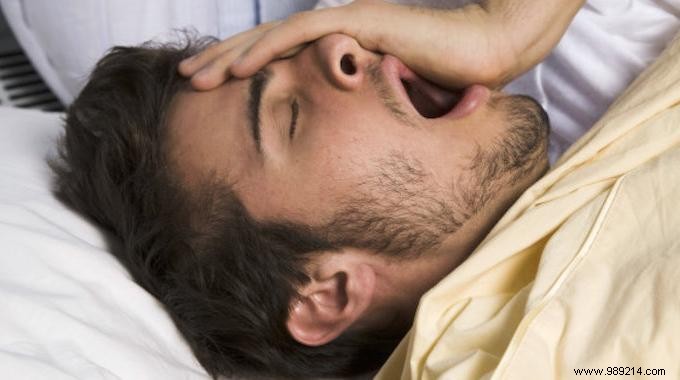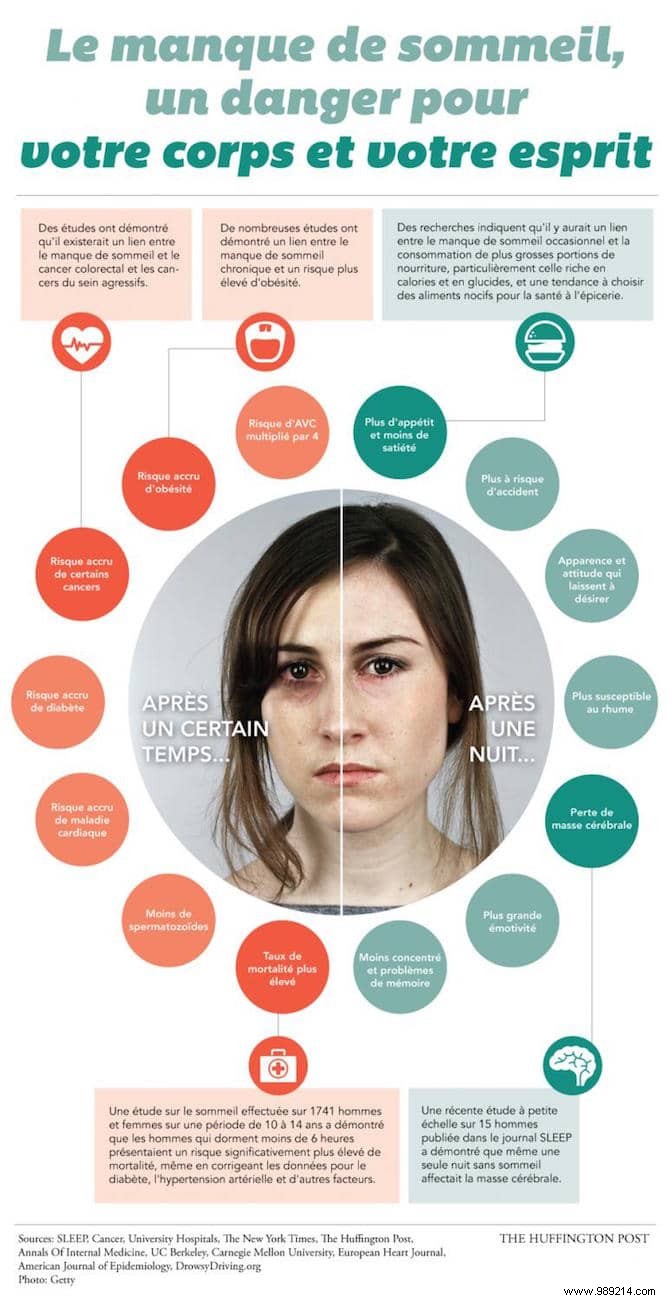
Lack of sleep, whether voluntary or involuntary, is harmful for the body.
Sleep deprivation is rightly considered torture.
Did you know that sleeping less than 6 hours a night for a week negatively impacts 700 genes in your body?
Even a small lack of sleep has a negative effect on our health. This study confirms this.
This is an observation that poses a problem when we know that 17% of 25-45 year olds can be considered to be sleep deprived in France.

In addition, 45% of respondents believe they sleep less than they need, according to a study conducted by INPES.
In general, it is considered that you should sleep 7 hours a night. If you sleep less, you incur a sleep debt.
Lack of sleep can wreak havoc on the body and mind.
Nothing beats an infographic to understand the impact of lack of sleep on health, even after just one night:

Source:Huffington Post and infographic by Alissa Scheller
You are hungrier and your feeling of satiety is altered. You have more and more appetite. It's normal:according to scientific studies, short-term lack of sleep and a tendency to eat more than normal are linked. Not only do we eat larger portions, but we also spontaneously opt for dishes that are richer in calories and carbohydrates. When we go shopping, it's the same, we abandon healthy dishes to turn to those that are less good for health.
You increase the risk of road accidents. Know that sleeping less than 6 hours per night multiplies by 3 the risk of accident on the road, according to this study. Even a single night of poor sleep impairs your eye-flying coordination, according to research from Manchester Metropolitan University. Driving is not the only one affected. According to the Prevention website, when you sleep less well or badly, you become clumsy.
Your physical appearance begins to suffer. It's not for nothing that we talk about restorative sleep. The journal SLEEP published a study on this subject. She showed that sleep deprived people were less attractive and were more likely to be sad. According to another study conducted in Sweden, it is more difficult to get in touch with people who feel tired. The older we get, the more the effects of lack of sleep are felt on the physical. Researchers have found a link between lack of sleep and premature aging of the skin.
You are more likely to catch a cold. Tired, it is more likely to catch a cold. Sufficient rest is the first reflex to adopt to have an effective immune system. According to the study conducted by Carnegie Mellon University, sleeping less than 7 hours per night is equivalent to a 3 times greater risk of catching a cold. According to the Mayo Clinic, the immune system releases proteins called cytokines during sleep. Some of them promote sleep. When you have an infection, inflammation or stress, certain cytokines increase. Lack of sleep has the effect of reducing the production of these proteins. So does the number of antibodies and specialized cells that fight infections. All because of lack of sleep!
You lose brain mass. A study, published in the journal SLEEP, indicates that a single night of poor or insufficient sleep was enough to cause a loss of brain mass. The scientists used blood levels of two molecules that increase after brain injury to come to this conclusion.
You become more emotional. You must have noticed that when we are tired, we are more emotional. Scientists from the University of California, Berkeley and Harvard Medical School have used medical imaging to highlight the link between emotionality and lack of sleep. They showed that the emotional centers of the brain were more reactive up to 60% when we sleep little. “When deprived of sleep, the brain seems to revert to more primitive circuitry, in that it suddenly seems unable to put certain emotions into context in order to produce a controlled and appropriate response”, specifies one of the authors of this study. , Matthew Walker, director of UC Berkeley's Sleep and Neuroimaging Laboratory. "If you're sleep deprived, you're not in your normal state, emotionally."
You have difficulty concentrating and memory problems. Because of fatigue, your memory is playing tricks on you. And you find it harder to concentrate. Exhaustion causes memory loss. You may have noticed:after a bad night's sleep or a too short night's sleep, we have an annoying tendency to lose our keys, our wallet and to forget a whole bunch of important papers. As researchers at Harvard University explain, sleep helps consolidate your memory. It is for this reason that lack of sleep can disrupt learning and make memorization more difficult.
You multiply by 4 your risk of strokes. In the medium and long term, the risk of stroke is multiplied by... four. Several studies presented at the 2012 SLEEP conference come to the following conclusion:sleeping less than 6 hours per night for people of middle or middle age significantly increases the risk of stroke. "People who sleep less than 6 hours a night were 4 times more likely to have stroke symptoms than those who sleep between 7 and 8 hours," recalls Megan Ruiter, one of the researchers who participated in this study from the University of Alabama at Birmingham.
You increase your risk of obesity. Lack of sleep increases the risk of obesity. Not only do we eat more and more high-calorie foods, but there is a proven link between chronic lack of sleep and the risk of obesity. Thus sleeping less than 6 hours is associated with changes in ghrelin and leptin levels, hormones that control appetite, according to a study by Penn State University. Another 2012 study published in the American Journal of Human Biology shows that lack of sleep and appetite regulation are correlated. Lack of sleep causes people to eat more. A final study confirms these conclusions:conducted by the University of Pennsylvania, it establishes that people who suffered from a lack of sleep for 5 nights had gained a kilo. Nocturnal snacking is implicated.
Your risk of certain cancers may increase. A cancer study was conducted on 1240 people undergoing a colonoscopy (or colonoscopy), the result shows that the risk of developing a colorectal adenoma is 50% higher in participants who slept less than 6 hours per night. A colorectal adenoma is a benign tumor that can develop into a malignant tumor. A link was also highlighted between lack of sleep and aggressive breast cancer in a 2012 study. Finally, sleep apnea and the risk of developing cancer are also correlated.
You increase your risk of developing diabetes. The risk of diabetes also increases with lack of sleep. A large number of chronic diseases, including type 2 diabetes, are impacted by a lack of sleep or too much sleep. According to a 2012 study, hormonal changes linked to obesity and reduced insulin sensitivity – a factor in diabetes – are linked to lack of sleep.
You increase your risk of heart disease. The risk of heart disease increases. From high blood pressure, to atherosclerosis (arteries blocked by cholesterol), to heart failure and stroke, heart disease is more common in people who don't get enough sleep, according to a Harvard Health report Publications. The results of another study conducted by researchers at Warwick Medical School point in the same direction. Researchers have shown that sleeping less than 6 hours per night or sleeping poorly increases the risk of heart attack, vascular problems and stroke. "If you sleep less than 6 hours a night and your sleep is disturbed, your risk of suffering or dying from heart disease increases by 48% and your risk of suffering or dying from a stroke increases by 15%", specifies Francesco Cappuccio the lead author of this study, published in the European Heart Journal. “The modern trend of going to bed late and getting up very early is nothing short of a ticking time bomb for your health. It is imperative to act quickly to reduce your risk of these life-threatening illnesses. ."
The number of sperm decreases. Obviously, fatigue does not encourage somersaults under the duvet. But beyond this unfortunate fact, lack of sleep decreases fertility. Men who experience significant sleep disturbances have a 29% lower concentration of sperm. This is the result of a study published in 2013 by the American Journal of Epidemiology and involving 953 young men from Denmark.
You increase your risk of dying prematurely. According to a study by SLEEP, conducted over 10 to 14 years, on 1741 men and women, men who sleep less than 6 hours per night have a significantly higher mortality rate, even after taking into account factors related to diabetes. , hypertension or other...
Source: The huffington Post